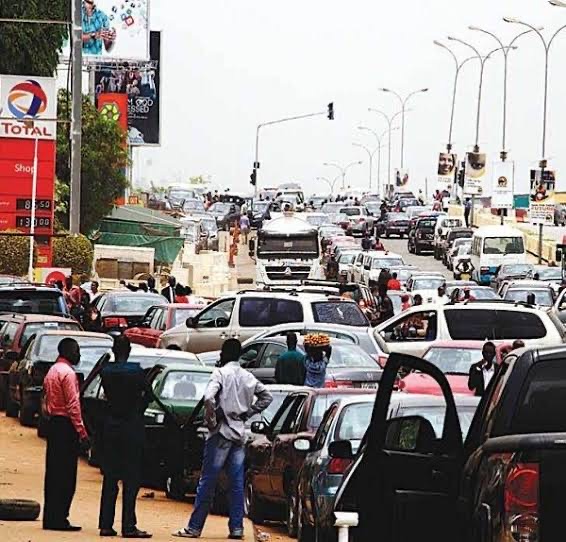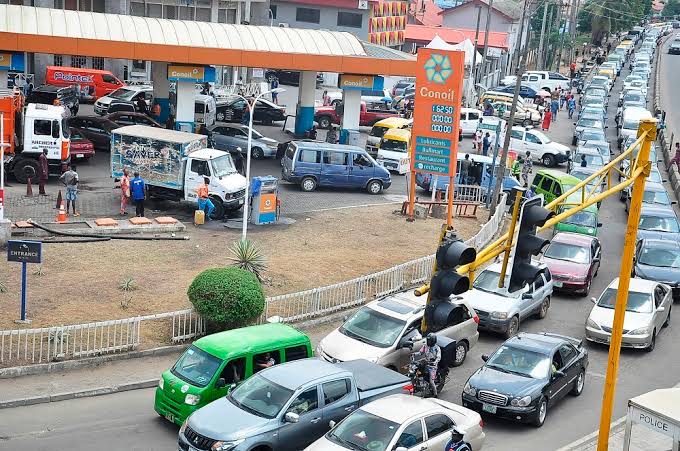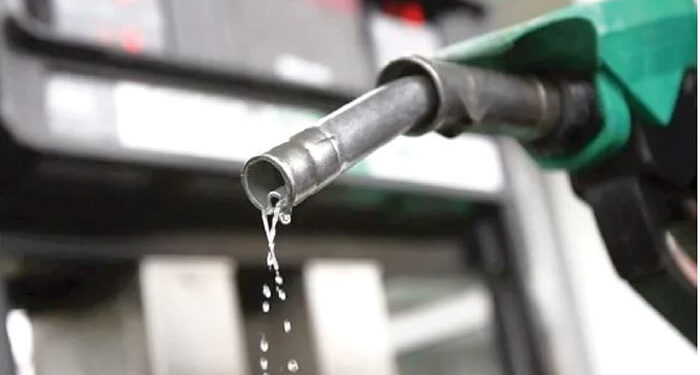Motorists have expressed deep frustration over the worsening petrol scarcity, which continues to be a nightmare with no end and no effective solution in sight.
Stakeholders are being called upon to take swift action to resolve the supply gap and prevent a major economic disruption.
In separate interviews with Journalists, motorists expressed frustration over the significant loss of productive time at petrol stations, a time wasted that they complained could have been invested in more productive pursuits.
Some said they now have to return to petrol stations only to close and sleep in their cars to get their supplies at dawn. Long queues were seen at petrol stations across Lagos, from Ikeja, Maryland to Surulere, Ojota, Lagos Island, Ikoyi, Victoria Island, Isolo, Apapa, Ogba, and Abule-Egba.

While major dealers sold fuel, independent dealers had mostly closed their stations due to product scarcity.
Mr Monday Ejike, a professional driver at Mobil petrol station, Dayo Adeniji Street, Abule-Egba, Lagos, reported that he had been queuing since 5 am on Sunday to get fuel for the coming week. He expected it to be a productive week and was keen to avoid further disruptions.
Similarly, Mr. Shina Egbeyemi, a second-generation banker, said he had to forego attending church services to fill up. Egbayemi expressed concern that Nigeria, an oil-rich country, should not subject its people to such severe hardship. He described the fuel crisis as a sign of national failure and called on authorities to address the problem and end the national embarrassment.
The fuel shortage worsened traffic congestion across Lagos, with vehicles often having to drive for long periods on congested roads. At some petrol stations along major arterial roads, traffic jams stretched for more than two kilometres.
Traffic congestion worsened in Alapale, near the Third Mainland Bridge, where petrol stations are densely packed together, as motorists struggled to reach the bridge. At 2 pm on Sunday, traffic was backed up on 7UP up to Osada Interchange and the old toll gate.
Industry players suspect the crisis may be linked to NNPC Ltd’s debt to oil traders. Apapa warehouse officials reported a sharp decline in cargo arriving at the country’s ports in the past two months. They reported that loading activities have dropped significantly as Abuja has been given priority, which has led to the rationing of petroleum products.

A solution to the crisis remains uncertain unless there is a significant increase in the volume of imported cargo in the coming weeks. Meanwhile, NNPC Ltd admitted that it is facing financial challenges due to fuel supply costs, which pose a threat to the sustainability of fuel supply.
In a statement, NNPC Ltd Chief Corporate Communications Officer, Olufemi Sonye, admitted that financial challenges are putting the company under significant pressure.
With a total debt of about $6 billion accumulated, global petrol suppliers are no longer willing to supply products on credit to the Nigerian national oil company, NNPC Ltd.
NNPC Ltd had initially dismissed reports of about $6 billion in debt to oil traders, describing the loan as a normal business practice.
NNPC Ltd remains committed to acting as a supplier of last resort and ensuring national energy security in accordance with the Petroleum Industry Act (PIA). We are actively working with relevant government agencies and other stakeholders to ensure a stable supply of petroleum products across the country.”
Despite a directive by the Nigerian Midstream and Downstream Petroleum Regulatory Authority (NMDPRA) to ban the sale of fuel in petrol cans, the activities of “black market dealers” in collaboration with some petrol station operators have further exacerbated the plight of motorists.
While many law-abiding consumers go to the trouble of joining long queues to wait their turn, those who can afford to pay an extra 2,000 naira to take the illegal route to a petrol station can afford this “luxury”.
Moreover, black market dealers have free access to petrol stations, where they buy fuel from major dealers at the regulated price of 618 naira per litre and sell it directly at the entrance of the petrol station for 1,000 to 1,100 naira per litre.
Most of these illegal traders are found along major roads such as Mobolaji Bank Anthony, Airport Road, College Road, and Lagos-Abeokuta Expressway. The directive comes amid ongoing petrol shortages and long lines at the few filling stations stations in major cities that still supply fuel.
In a video posted to X (formerly Twitter), one of the NMDPRA officials, who appears to be conducting an on-site inspection, is seen threatening to revoke the retail licenses of gas stations that do not comply with the policy.
“We will withdraw your licence. You have to take this seriously. No selling in jerrycans,” the officer repeatedly warns in the video recording.
































